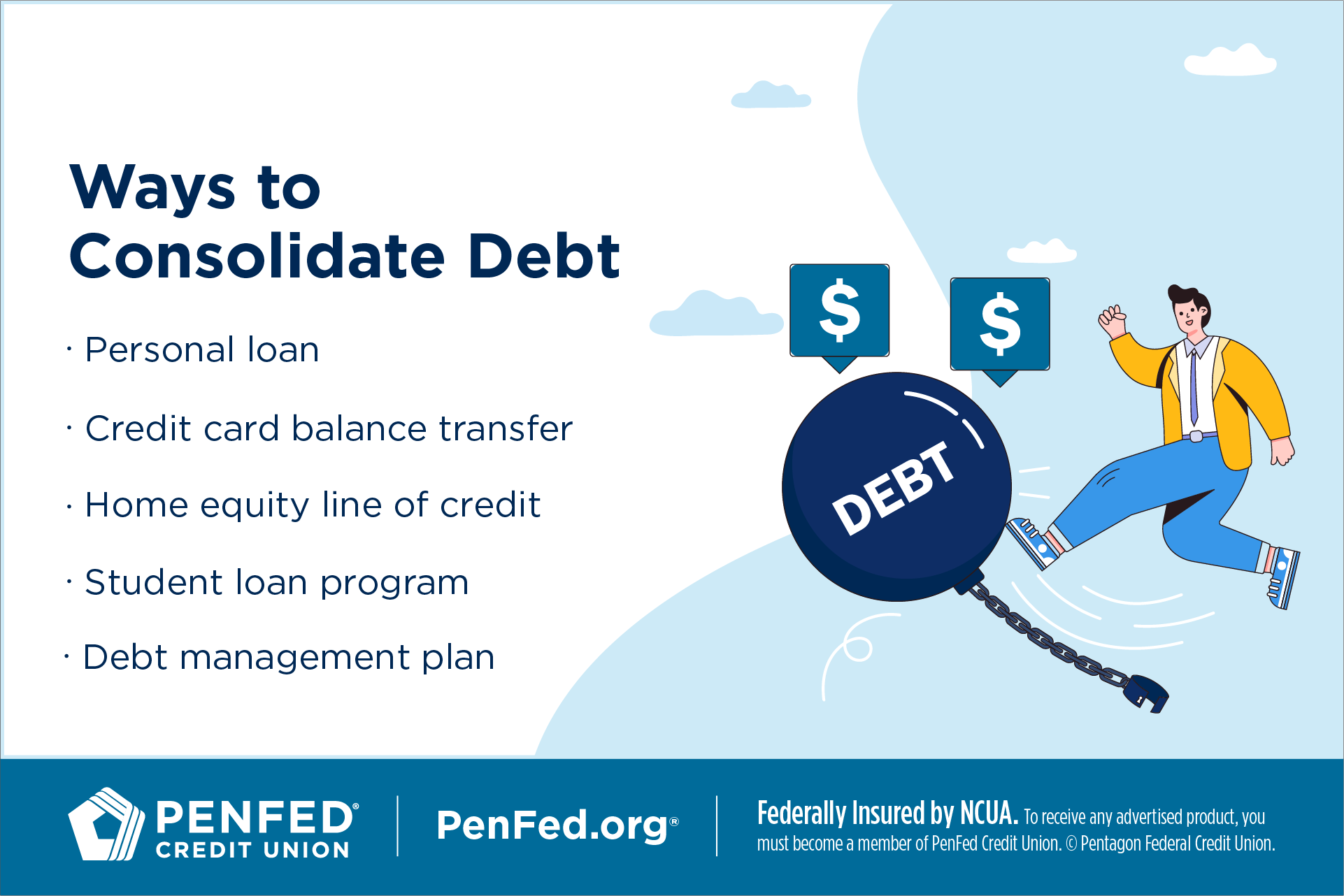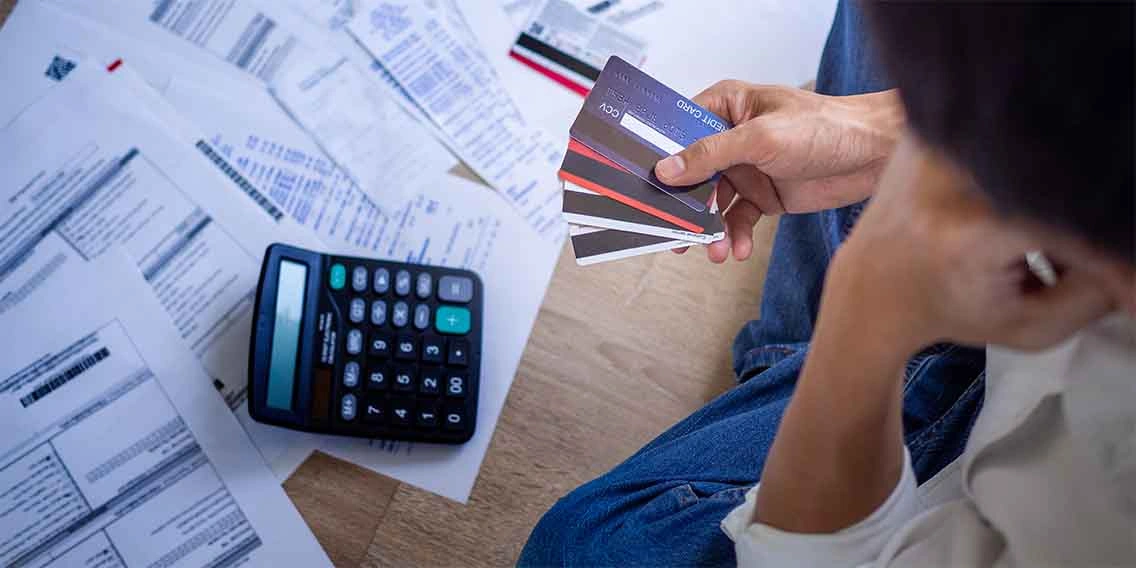Personal Loans
What Debt Consolidation is and How to Get Started
What you'll learn: If you should consider consolidating debt
EXPECTED READ TIME:9 MINUTES
Debt is stressful. Yet for many Americans, it’s the only way to get by. While not all debt is bad, carrying debt month-to-month with no clear plan to pay off creates a bad situation.
Whether you're struggling with credit card debt, student debt, or other types, we'll explain what it means to consolidate debt, ways to do it, and the potential advantages and disadvantages of doing so.

What Is Debt Consolidation?
Debt consolidation is combining multiple debts into a single debt. Usually, this is done by taking out a new loan at a lower interest rate and using it to pay off your other debts. The goals of any form of debt consolidation are to lower the amount of interest you pay on your debt and, ideally, reduce your monthly payments.
Who Benefits From Debt Consolidation?
Debt consolidation is helpful for those strapped with several high-interest debts, such as credit cards, a car loan, and student loans. Consolidation allows you to make one monthly payment for all of your debts, often at a lower interest rate.
How Does Debt Consolidation Work?
Let's say you're carrying a balance on two credit cards, each with an interest rate of 19.00% APR, plus a student loan with an interest rate of 8.00% APR.
Instead of making three monthly payments, you can consolidate those three debts into one single debt. This could be done by taking out a debt consolidation loan and using that borrowed money to pay off the balances of your credit cards and student loan. Then you will make monthly payments toward your debt consolidation loan until the loan term ends.
Find a loan or plan with a lower interest rate than what you originally had across your individual debts.
When consolidating debt, you want to find a loan or plan with a lower interest rate than what you originally had across your individual debts. This may help reduce your monthly payment. You also want to make sure you don't get a longer term than what you already had, to avoid paying more interest over time.
Once you're approved for a new loan or enrolled in a debt management plan, you can begin making your monthly payments until all of your debts are paid down.
Run your numbers through a debt consolidation calculator to find out how much you may be able to save.
Ways to Consolidate Debt
There are different ways to consolidate debt. For example, most credit unions, banks, and other lenders offer debt consolidation loans, credit card balance transfers, and more. Or you can find not-for-profit debt management companies or credit counseling agencies that offer debt management plans.
Each method of consolidating debts has its strengths and weaknesses, and it may be easier for you to qualify for some forms of debt consolidation. It’s important to consider your options carefully.
Debt Consolidation Personal Loan
With a personal loan (secured or unsecured), you receive the borrowed money in one lump sum with a fixed interest rate and a set number of payments until your debt is paid off.
While personal loans typically have lower interest rates than credit cards, you need good credit to qualify for a low rate. When you apply for a consolidation loan, the lender assesses your repayment history, credit scores, and other factors to determine whether you're likely to be able to pay back your loan.
You have to be creditworthy to get approved for a debt consolidation loan, and there steps you may need to take to qualify for a personal loan.
With a personal loan, you receive the borrowed money in one lump sum with a fixed interest rate and a set number of payments.
Credit Card Balance Transfer
Many credit card companies and credit unions offer balance transfers, which allow you to move your existing card balances to a new card with low or no interest.
Here are a few factors to consider:
A 0% annual percentage rate (APR) typically has a limited time frame of 12-18 months. After that, standard interest rates may apply if you still have a balance.
You may have to pay a transfer fee of 2-5%. This fee is added to your balance.
You need a very good to excellent credit score to qualify.
This method will align best with your goals if you plan on paying off your balance before the 0% introductory APR period ends.
Home Equity
You can also consolidate debt with a home equity loan or home equity line of credit (HELOC). These options typically have low interest rates, so your debt may carry less interest in the long run. You also may be able to reduce that burden even more if you eventually refinance and roll both loans (your first mortgage and the HELOC/home equity loan) into one new one.
Since these options require you to borrow against the equity in your home, not paying the loan back could result in the lender foreclosing on your home. For that reason, using your home’s equity can be a powerful move, but one that requires a lot of strategy and commitment.
Using your home’s equity can be a powerful move, but one that requires a lot of strategy and commitment.
Student Loan Program
For the 43 million Americans with student loan debt, there are ways to consolidate student loans. One option is to consolidate federal loans through the federal government with options such as the Federal Direct Loan Program.
Another option is to consolidate your student loans through a private lender, such as a bank, credit union, or specialized student loan lender. However, federal student loans often have the most competitive interest rates, and consolidating through a private lender will make you ineligible for federal student loan benefits such as:
Income-driven repayment (IDR) plans
Public Service Loan Forgiveness (PSLF)
Deferment and forbearance
Debt Management Plan
A debt management plan is a way to consolidate without getting an additional loan. A debt management company or credit counseling agency will combine your debts into one monthly payment and coordinate with your creditors to negotiate a lower interest rate.
You'll then make your payments to the company or agency, which will allocate your money to your creditors. The end goal is for you to pay down your debt in 3-5 years.
Here are a few factors to consider:
Debt management plans don't base eligibility on credit scores, so this may be a good option for borrowers with lower credit scores.
While the plan itself may not directly impact your credit score, your participation will be noted on your credit report, which may indirectly and temporarily impact your credit score.
There may be set-up or maintenance fees but watch out for unnecessary application or membership fees.
Provided by not-for-profit companies, these programs often include credit counseling and education programs to help you improve your money management skills.
A debt management plan is a way to consolidate without getting an additional loan.
Pros and Cons of Debt Consolidation
Like with any financial strategy, there are advantages and disadvantages to consolidating debt. Your finances are unique to you, and consolidation isn’t always the right choice. Here’s what you need to consider:
The Benefits of Debt Consolidation
Depending on your financial situation and which approach you choose, debt consolidation could have several potential benefits.
For example, if your consolidation loan has a lower interest rate than your original loan, you'll end up with a lower monthly payment amount. Or if you select a shorter term when you consolidate, you could pay off your loan faster.
Other benefits include one monthly payment instead of several, and the ability to choose a fixed rate so you never have to worry about rate hikes. Finally, consolidation loans generally come with installment plans, so you have an end date when you’ll be debt free.
The Drawbacks of Debt Consolidation
The main drawback is that consolidating to a higher interest rate or a longer term than your original loan could cause you to pay more interest over time. But it depends on your loan terms.
Plus, whenever you're talking about a loan, you also have to be aware of the potential fees: balance transfer fees, closing costs, prepayment penalties, or loan origination fees.
Something to also remember is that debt consolidation won't prevent you from going back into debt — you have to be willing to change your financial habits.
Debt consolidation won't prevent you from going back into debt — you have to be willing to change your financial habits.
How Debt Consolidation Affects Your Credit
Applying for any loan results in a hard credit inquiry, which can temporarily lower your credit score by up to five points. A debt management plan isn't a loan, so doesn't require a hard credit inquiry, but it may indirectly impact your credit score.
But debt consolidation could be good for your credit in the long run. Making on-time payments and reducing your debt-to-income ratio will improve your credit score over time. In fact, one study by LendingTree suggested people who consolidate their debt could boost their credit score by 86 points.
Debt Consolidation Methods by Impact on Your Credit Score
Debt consolidation can impact your credit score in different ways depending on the method of consolidation. See which option benefits you most.
|
Debt Consolidation Method |
Credit Check |
Impact on Credit Score |
|---|---|---|
|
Personal Loan |
Hard credit inquiry |
Temporarily lowers credit score |
|
Home Equity Loan/HELOC |
Hard credit inquiry |
Temporarily lowers credit score |
|
Student Loan Program |
Hard credit inquiry |
Temporarily lowers credit score |
|
Credit Card Balance Transfer |
Hard credit inquiry |
Temporarily lowers credit score |
|
Debt Management Plan |
Eligibility not based on credit score |
May indirectly and temporarily impact your credit score |
Is Debt Consolidation Right for You?
Consolidating debt depends on your financial situation. You may be ready to explore debt consolidation if:
You're having trouble keeping up with your monthly payments
You're paying down debt on five or more credit cards
You've maxed out your credit cards or are close to your credit limit
You have a high enough credit score to qualify for a lower loan rate
You're willing to change your spending habits, meaning you won't rack up more debt
While consolidation has many advantages, it might not be your best choice if:
You have a small amount of debt
You're considering student loan forgiveness
You need to improve your credit score because you likely won't qualify for a lower interest rate
You don't intend to change your financial habits, which means you could wind up back in debt
The Takeaway
Debt consolidation works best when you don't take on any more debt as you pay down your existing debt, and it could take between 3-5 years before you finish paying off everything. But for many people, debt consolidation is the solution to nagging bills that are holding them back from other financial goals.
Explore a Debt Consolidation Loan
Get a closer look at how consolidating could help you.




